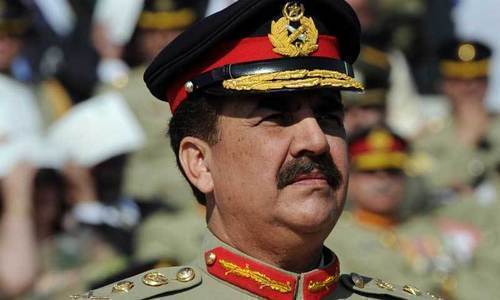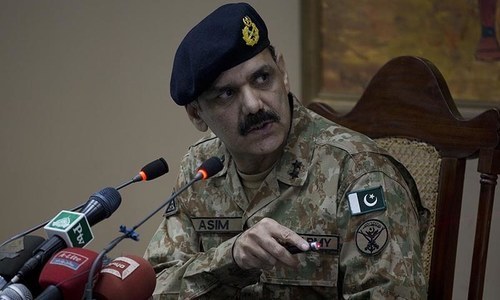The action ordered by the army chief against six officers for offences committed during their tenures in the Balochistan Frontier Corps generated considerable debate on social media where some commentators lauded the military action while others questioned why the offenders were allowed to keep their pensions, medical benefits and were not jailed.
Such questions were expected against the backdrop of the army chief’s call for steps to curb corruption as the battle against terrorism could not be won with widespread corruption eating away at the vitals of society.
Many observers said his statement that came on the heels of the Panama Papers leak amounted to ‘interference’ in the civilian domain and advised him to also focus on corruption within his institution.
But insiders defended their chief, saying he was not asking anyone to do what he wasn’t doing within his own rank and file. “His men have responded to his call and have taken casualties in several thousands in the fight against terrorism. He will demonstrate how he respects their memory and will not tolerate wrongdoing within his institution,” said one source.
Before further ado, the ‘dismissals’ news was leaked to the media though officially it took the army’s spokesperson a couple of weeks to confirm it in passing during a TV interview where he wouldn’t give any further details.
While these corrupt officers were in the saddle, hundreds of Baloch went missing.
A request to an expert got me this background to the kind of action that was taken: “When a wrongdoing is detected, the first step is to institute a court of inquiry. The CI looks into the case and prepares ‘a summary of evidence’. If the summary establishes that there are reasonable grounds for taking action against the officer, he is presented with it and given a choice:
“He can either face a court martial or accept administrative action by the chief. If he accepts an FGCM [field general court martial], he is released from the command and attached to the local corps HQ. He is free to hire a military or civilian defence counsel. How long the proceedings take will depend on various factors. FGCM can either acquit him or punish him.
“That punishment can go much beyond the forfeiture of his perks. It can result in imprisonment. On the plus side, he can appeal against the verdict.... In case of his acceptance of administrative action, the chief can forfeit all his perks and other benefits except his pension and medical facilities.” In this case all the officers opted for administrative action.
It is already in the public domain that the inquiry was initiated by the deaths of two officers in a car crash; they had been ordered to fix and test-drive an expensive high-performance car belonging to the son of the last IGFC, Maj-Gen Ejaz Shahid, towards the end of 2014.
An internal FC inquiry tried to hush up the matter, suggesting the two officers were on leave and, therefore, there was no institutional responsibility. Their families protested as they feared losing some of the ‘on-duty’ benefits and wrote to the army chief. The inquiry opened up a Pandora’s Box. The officers were not on leave and were on active duty. This wasn’t all.
Widespread corruption, involving expensive smuggled cars (especially when the PPP announced an amnesty to regularise non-duty-paid imports in March 2013) and alleged drug trafficking, was unearthed. Although sources are not saying much, it has been possible to gather some snippets which hint at the scale of the corruption. Most of the crimes were said to have been committed between 2009-2010 and 2014.
One key officer involved headed the Pishin Scouts and Ghazaband Scouts as a colonel. When Brig Asad Shahzada arrived in Kharian to take command of a brigade on promotion; many officers were shocked to see him alighting from a personal Land Cruiser. Another two were said to be in tow.
Later he was posted as centre commandant, Armoured Corps and was arrested literally as his retirement farewell ended by the little known but feared Special Investigations Branch officers who report to the adjutant-general, Pakistan Army. It was the previous AG who had conducted the probe.
Former Brig Asad Shahzada remains in the custody of SIB and reportedly a sum of Rs13 billion has been/is being recovered. On being questioned he spilled the beans. Another officer who was posted as sector commander Chaman, Lt-Col Haider is said to have coughed up about Rs1bn already. He is said to have been willing to oblige any senior who wanted a smuggled vehicle during the PPP amnesty.
More details about the others are not forthcoming but it has been reported already that during the initial investigation Maj-Gen Ejaz Shahid was unable to establish a source of income for the expensive high-performance car he gave presented his son.
The said officers have been disgraced and have lost all plots, houses they became entitled to as per the army’s generous perks to senior officers. It will of course remain an issue why they escaped prison sentences.
The only reason one can think of is that the army chief who is leading his men in a battle against terrorists did not want the deeds of a handful casting a shadow over the blood sacrifices of hundreds of other upright, valiant officers and men. This could have had an adverse impact on morale.
While these corrupt officers were in the saddle, hundreds of Baloch went missing many of whose tortured bodies were later found dumped. The finger of blame pointed to FC or its non-state allies.
Equally, dozens of their own FC colleagues and men were being killed in the fight against separatists. How could their judgement in any area have been trustworthy, and how could they have remained in saddle for as long as they did? Alas, the dead can’t be brought back to life.
The writer is a former editor of Dawn.
Published in Dawn, May 7th, 2016















































